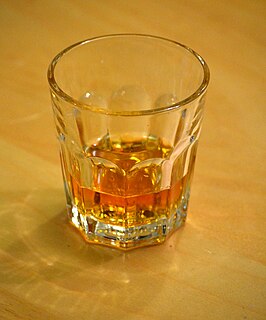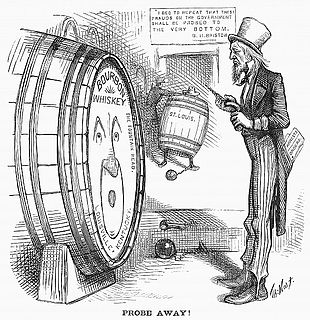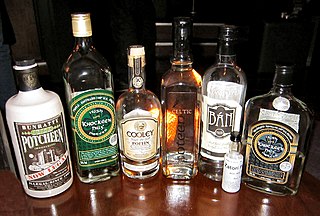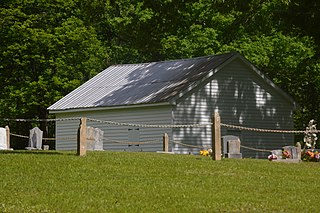Related Research Articles

Canadian whisky is a type of whisky produced in Canada. Most Canadian whiskies are blended multi-grain liquors containing a large percentage of corn spirits, and are typically lighter and smoother than other whisky styles. When Canadian distillers began adding small amounts of highly-flavourful rye grain to their mashes, people began demanding this new rye-flavoured whisky, referring to it simply as "rye". Today, as for the past two centuries, the terms "rye whisky" and "Canadian whisky" are used interchangeably in Canada and refer to exactly the same product, which generally is made with only a small amount of rye grain.

Whisky or whiskey is a type of distilled alcoholic beverage made from fermented grain mash. Various grains are used for different varieties, including barley, corn, rye, and wheat. Whisky is typically aged in wooden casks, generally made of charred white oak.

Franklin County is a county located in the Blue Ridge foothills of the U.S. state of Virginia. As of the 2010 census, the population was 56,159. Its county seat is Rocky Mount.

Moonshine was originally a slang term for high-proof distilled spirits that were and continue to be produced illicitly, without government authorization. Distilling such spirits outside a registered distillery remains illegal in the United States and most countries around the world. In recent years, however, commercial products labeled as moonshine have seen a resurgence of popularity.
Rocky Mount is a town in and the county seat of Franklin County, Virginia, United States. The town is part of the Roanoke Metropolitan Statistical Area, and had a population of 4,799 as of the 2010 census. It is located in the Roanoke Region of Virginia.

The Chicago Seven were seven defendants—Abbie Hoffman, Jerry Rubin, David Dellinger, Tom Hayden, Rennie Davis, John Froines, and Lee Weiner—charged by the US federal government with conspiracy, inciting to riot, and other charges related to anti-Vietnam War and countercultural protests that took place in Chicago, Illinois, on the occasion of the 1968 Democratic National Convention. Bobby Seale, the eighth charged, had his proceedings declared a mistrial, dropping the number of defendants from eight to seven.

The Whiskey Ring was an American scandal, exposed in 1875, involving the diversion of tax revenues in a conspiracy among government agents, politicians, whiskey distillers, and distributors.
The Gainesville Eight were a group of anti-Vietnam War activists indicted on charges of conspiracy to disrupt the 1972 Republican National Convention in Miami Beach, Florida. All eight defendants were acquitted.

Rum-running or bootlegging is the illegal business of transporting (smuggling) alcoholic beverages where such transportation is forbidden by law. Smuggling usually takes place to circumvent taxation or prohibition laws within a particular jurisdiction. The term rum-running is more commonly applied to smuggling over water; bootlegging is applied to smuggling over land.
Olmstead v. United States, 277 U.S. 438 (1928), was a decision of the Supreme Court of the United States, in which the Court reviewed whether the use of wiretapped private telephone conversations, obtained by federal agents without judicial approval and subsequently used as evidence, constituted a violation of the defendant’s rights provided by the Fourth and Fifth Amendments. In a 5–4 decision, the Court held that neither the Fourth Amendment nor the Fifth Amendment rights of the defendant were violated. This decision was later overturned by Katz v. United States in 1967.

Poitín or poteen is a traditional Irish distilled beverage. Poitín was traditionally distilled in a small pot still and the term is a diminutive of the Irish word pota, meaning "pot". The Irish word for a hangover is póit. In accordance with the Irish Poteen/Irish Poitín technical file, it can only be made from cereals, grain, whey, sugar beet, molasses and potatoes.
Roy Olmstead was one of the most successful and best-known bootleggers in the Pacific Northwest region during American Prohibition. A former lieutenant in the Seattle Police Department, he began to bootleg part-time while still on the force. Following his arrest for that crime, he lost his job in law enforcement and turned to illegally importing and distributing alcohol from Canada as a full-time and highly profitable occupation. Eventually, wiretaps of his phones provided sufficient evidence for his arrest and prosecution, despite an appeal that reached the Supreme Court regarding the legality of the wiretap.
The Double Jeopardy Clause of the Fifth Amendment to the United States Constitution provides: "[N]or shall any person be subject for the same offence to be twice put in jeopardy of life or limb..." The four essential protections included are prohibitions against, for the same offense:

John Paul Jr. was a United States Representative from Virginia, and later a United States District Judge of the United States District Court for the Western District of Virginia.
Marvin "Popcorn" Sutton was an American Appalachian moonshiner and bootlegger. Born in Maggie Valley, North Carolina, he grew up, lived, and died in the rural areas around Maggie Valley and nearby Cocke County, Tennessee. He wrote a self-published autobiographical guide to moonshining production, self-produced a home video depicting his moonshining activities, and was later the subject of several documentaries, including one that received a Regional Emmy Award.
Moonshine is a generic term for distilled alcoholic beverages made throughout the globe from indigenous ingredients reflecting the customs, tastes, and raw materials for fermentation available in each region. The term commonly applies to small-scale production, which is often illegal or tightly regulated in many countries.

Hutaree is a militia movement group adhering to the ideology of the Christian Patriot movement, based near Adrian, Michigan, in the United States. The group formed in early 2006. The name "Hutaree" appears to be a neologism; the group's web site says that the name means "Christian warriors", but an investigation by the FBI concluded the word doesn't have a Christian background. The group became widely known in 2010 after the United States FBI prosecuted them in federal court for an alleged plan for violent revolt. The prosecution said they intended to kill a police officer and to attack the funeral with bombs. The presiding judge dismissed these charges. Three members pleaded guilty to possessing a machine gun and were sentenced to time served.

Moonshiners is an American docudrama television series on the Discovery Channel produced by Magilla Entertainment that dramatizes the life of people who produce (illegal) moonshine in the Appalachian Mountains of Kentucky, North Carolina, South Carolina, Tennessee, and Virginia. The series dramatizes their liquor production efforts, law-evading techniques and life. There have been claims by local officials that the show is not what it portrays to be. Virginia authorities have stated that no illegal liquor is actually being produced by the people depicted in the show. The Virginia Department of Alcoholic Beverage Control (ABC) said in March 2012 that, "If illegal activity was actually taking place, the Virginia ABC Bureau of Law Enforcement would have taken action." They also said that they had requested for the producers to add a disclaimer to clarify that the show was only a dramatization, "but the request was overlooked", and the show's producers, Magilla Entertainment, have stated their documentary content is real.

The Wettest County in the World is a 2008 historical novel by Matt Bondurant, an American writer who features his grandfather Jack and grand-uncles Forrest and Howard as the main characters in the novel.

The Old Chapel Church, also known locally as the "Snow Creek Chapel", was built in 1769 as a chapel of ease for the Church of England parish in what is today Penhook, Virginia, United States.
References
- 1 2 "Moonshining Reputation Built on Long History". The Franklin News Post. October 10, 2007. Retrieved October 6, 2014.
- ↑ William B. Hopkins, Another View of the Great Moonshine Conspiracy Trial of 1935, VBA News Journal, p. 19 (Winter 2009/2010).
- ↑ Thompson, Charles D. (April 2011). Spirits of Just Men : Mountaineers, Liquor Bosses, and Lawmen in the Moonshine Capital of the World. The University of Illinois Press. pp. 7–15. Retrieved October 6, 2014.
- ↑ William B. Hopkins, Another View of the Great Moonshine Conspiracy Trial of 1935, VBA News Journal, p. 20 (Winter 2009/2010).
- ↑ Writer, David M. Poole Staff. "Mystery of 1935 moonshine conspiracy continues". Roanoke Times. Retrieved 2020-01-23.